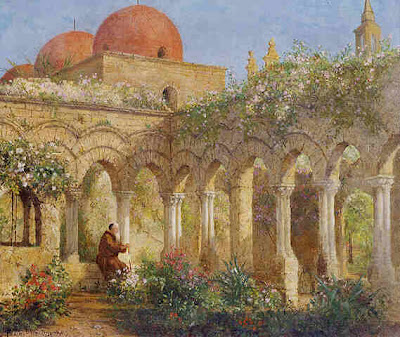I want to live totally, not just mostly, for God. I don't want to compromise this goal. Monasticism represents totality: that is its appeal for me. It may be that I can "get to heaven" by going to church on Sundays, by not living in major sin, by pursuing everyday luxuries while having Christ in a corner of my life. But that is not even close to enough for me. I want to live for God rather than for myself.
But why?
Because I want to be in a personal, ongoing relationship with God. I want to glorify Him with my thoughts and my actions and my very life. I love Him.
But why?
For the answer to this, I look as always to Scripture and the teachings of the Church.
"We, for our part, love because He first loved us." 1 John 4:19
God’s "love for his people is stronger than a mother’s for her
children. God loves his people more than a bridegroom his beloved; his
love will be victorious over even the worst infidelities and will extend
to his most precious gift: 'God so loved the world that he gave his
only Son.'" Catechism of the Catholic Church #219
"Can a mother forget her infant, be without tenderness for the child
of her womb? Even should she forget, I will never forget you. See,
upon the palms of My hands I have written your name." Isaiah 49:15-16)
"God loves each of us as if there were only one of us." St. Augustine
"I have called you by name; you are Mine." Isaiah 43:1
"God is love." 1 John 4:8
"I know you are unworthy, but rejoice all the more and take as many treasures from my Heart as you can carry, for then you will please Me more... Oh, how I love those souls who have complete confidence in Me. I will do everything for them." Jesus to St. Faustina
"Love Him totally Who gave Himself totally for your love." St. Clare of Assisi
____________________________________________________________________
For Prayer and Reflection:
- Do I believe God loves me, personally? Do I ever feel unworthy of His love?
- Can I talk with God about His love for me, and mine for Him?
- If I meditate upon the above quotes, does anything happen? Do I feel God speaking to me through any of them?
"God so loved the world that He gave His only Son, that whoever believes in Him may not die but have eternal life." John 3:16








_-_Maternal_Admiration_(1869).jpg)








_-_James_Tisso+detail.jpg)

